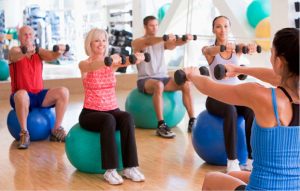Ageing brings changes to our bodies that can impact how we live. However, it doesn’t have to be synonymous with having a poor quality of life or becoming isolated. A wellness routine for seniors is key to ensuring we live as long as possible, with a good quality of life. This means meeting the needs of our body and mind, and being in a good physical and mental state.
An ideal wellness routine includes a healthy diet, quality sleep, and a balance of leisure, rest and physical activity. Having a daily routine helps us establish a clear structure to follow. If you stick to it consistently, you will improve your overall well-being.
Here are some ideas for wellness routines for seniors. Keep in mind that routines must be adapted to each individual’s needs, preferences and health conditions.
Establishing a healthy morning routine
Starting the day off on the right foot guarantees a great day. That’s why the first few hours after waking up are critical. Your morning routine can look like this:
- Waking up early
- Taking care of your personal hygiene needs and get dressed
- Eating a nutritious breakfast
- Doing some gentle stretching or meditation
- Taking a short walk or going grocery shopping
- Doing some light housework
If you combine healthy eating with physical activity and keep your mind engaged, you’ll start the day with the energy you need and in the best possible way.
In this routine, physical exercise is included as a fundamental activity, as regular physical activity has great health benefits at all stages of life. In older adults, physical exercise can reduce the risk of cognitive decline. According to a study by ScienceDirect, cognitive decline is almost twice as common among adults who are inactive compared to those who are active.
Regardless of if you do physical activity in the morning or at any other time of the day, it should be part of your routine to ensure better health.
Be active at midday
Midday is a great time to be active indoors or outdoors. Some of the things you can do at this time of the day are:
- Practising yoga, swimming or light exercise
- Going for a walk in nature or in your area
- Cooking for the rest of the day or week
- Taking care of your plants or garden
- Walking the dog or visiting a friend or relative
When it’s time for lunch, remember that nutritious, healthy food is key to a well-functioning body and mind. Taking care of your diet is crucial at all stages of life – especially for seniors, as eating well will make you feel more energetic and help your body and brain function properly for longer. As we get older, we need fewer calories, so we need to focus on the quality of our food rather than the quantity.
Midday is also one of the best times to be active outside or to do some exercise. This way, you won’t be too tired for sport because you woke up a few hours ago, and you can have time to rest in the afternoon to recover energy and carry on with the rest of the day.
Remember to stay hydrated! Hydration is key for helping our bodies function. It contributes to keeping our minds sharp and can even impact our mood. As part of your wellness routine, ensure that you’re drinking the recommended amount of water daily.
Enjoy your free time in the afternoon
If you have spent your morning and midday taking care of yourself, either with quality food or some exercise, the afternoon is an ideal time to take a break and participate in some leisure activities you enjoy.
Here are some of the activities you can do in the afternoon:
- Meeting friends for coffee, going for a walk or dancing (whatever you feel like!)
- Taking a nap
- Watching some television
- Going to the cinema, theatre or museums
- Visiting relatives or loved ones at home, or having them over
Maintaining a social circle of loved ones is an integral part of the human experience, so it makes sense to incorporate it into your wellness routine. Taking time to connect with other humans for conversation, laughs, support, and entertainment greatly impacts older adults. Among other benefits, it can help improve our mood, prevent isolation and depression and help us release endorphins.
Practise self-care in the evenings and get quality sleep
A good night’s sleep is one of the pillars of good physical and mental health, so it should be a priority in your wellness routine. As we age, we may notice some changes in our sleep routine. Maybe we get tired earlier, wake up earlier, or sleep less deeply. However, waking up tired or not being able to sleep well is not normal as we get older. Not sleeping well can lead to several issues, such as the increased risk of depression, attention and memory problems, or daytime tiredness.
Before you go to bed, you can practise some self-care, such as
- Reading a great book
- Taking a hot bath
- Giving yourself a massage
- Saying daily affirmations
- Trying out new recipes
- Listening to music
- Creating a soothing a skincare routine
Including relaxing tasks in your evening routine will help you go to bed feeling calmer, and get a better night’s sleep.
Which are the keys to a successful wellness routine for seniors?
 Proper nutrition and hydration
Proper nutrition and hydration
Food and hydration are essential for the body to function correctly and to prevent the development of certain diseases and conditions. If you need to know what changes you should make to improve your diet, you can visit a professional who will advise you on what foods to include in your diet, supplements you may need and how to implement these recommendations.
Stay active
Older adults need to be active to prevent health problems and improve overall well-being. Sports and physical activity have significant physical and mental benefits. A senior who engages daily in sports or other physical activity will have better cognitive function, secrete more endorphins, and will prevent cardiovascular disease and other diseases, such as diabetes and depression.
Take special care of mental health
Mental health includes our psychological, emotional and social well-being. Older adults are vulnerable to suffering from social isolation, depression or anxiety. That’s why it is essential to include activities in your routine that keep you mentally engaged and lead to meaningful and motivating experiences.
Spending time with loved ones, taking care of pets, engaging in hobbies that you are passionate about or exercising during the week can help you keep your mental health in good shape. If you need help, you can go to a professional to evaluate your situation and help you improve your quality of life.
Adapt your routine to your needs and preferences
Establishing a routine is important to manage time better, stay motivated, keep stress levels down and achieve a balance between all aspects of life. For people in need of care, a routine is also a valuable aid, as it allows the caregiver to better organise and manage the day-to-day while meeting the needs of the person being cared for.
Remember that a wellness routine must be implemented long-term to enjoy its positive impact on your health.
Gareth Mahon is the co-founder and CEO of The CareSide, a family-owned home care and disability support provider with offices throughout Australia.






